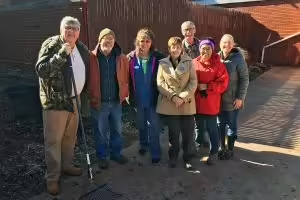PEORIA, Illinois - Eight University of Illinois Extension Master Gardener (EMG) trainees in the Fulton-Mason-Peoria-Tazewell Unit showed up on two chilly days in March at the Peoria Zoo as part of a new approach to official EMG training. It was the beginning of an 18-hour long volunteer skills training program. A follow-up to their 42 hours of classroom training and tests in the fall, this portion of their preparation to become active EMGs focused on highly practical skills, from personal safety to landscape design, from tool selection to diagnosing plant diseases with the help of a microscope, and working with children. Their first assignment was to build and practice skills by revamping the Pollinator Garden at the Peoria Zoo.
This Pollinator Garden is in a child-friendly space of about 336 square feet. It sits outside the building where the main entrance used to be, near a natural play area. Although well loved, it was in need of redesign in order to better manage the site’s unique conditions, add a number of native Illinois plants, and turn it into a solid educational experience for young and old alike. With the support of Zoo Director Yvonne Strode, the guidance of Extension Horticulture Educator Nicole Flowers-Kimmerle, and the leadership of veteran EMG May Bach, the group of trainees jumped right into their task.
Over two initial work sessions, the trainees used rakes and shovels from home and a Gator Utility Vehicle provided by the zoo staff, to clean up the site, start repairs to raised beds and the fence, and plan the best way to lay out the garden using scientific principles. May Bach commented “this garden can be used as an example to zoo visitors as methods and plants to duplicate in their own yards.” The efforts are on hold for the moment because of COVID-19, but the trainees are eager to resume the work later this season.
The zoo is operated by the Peoria Park District (PPD), one of the largest public parks in the entire nation relative to its population. Extension has long had a partnership with the PPD and master volunteers have served as docents, trail clearers, children’s events supporters, and in many other roles. PPD’s Luthy Botanical Garden, adjacent to the zoo, has been the site of hundreds of hours of volunteer time from Extension Master Gardeners for years.
Because of key commonalities between their educational and conservation missions, and their adherence to research-based practices, the PPD and Extension are natural partners. What’s more, the zoo alone attracts tens of thousands of visitors from the whole state and beyond, and that makes for a wonderful opportunity for Extension also to reach the learning public of all ages.
Illinois Extension provides practical translations of cutting-edge research to help people, businesses, and communities find answers to some of the most pressing issues of our modern world. Our work is guided by a desire to create meaningful progress toward addressing a select group of issues, which we call grand challenges: community, economy, environment, food, and health. Learn more at https://extension.illinois.edu/fmpt/horticulture
Source, Ian Goslin, Illinois Extension horticulture coordinator, ianmg@illinois.edu
